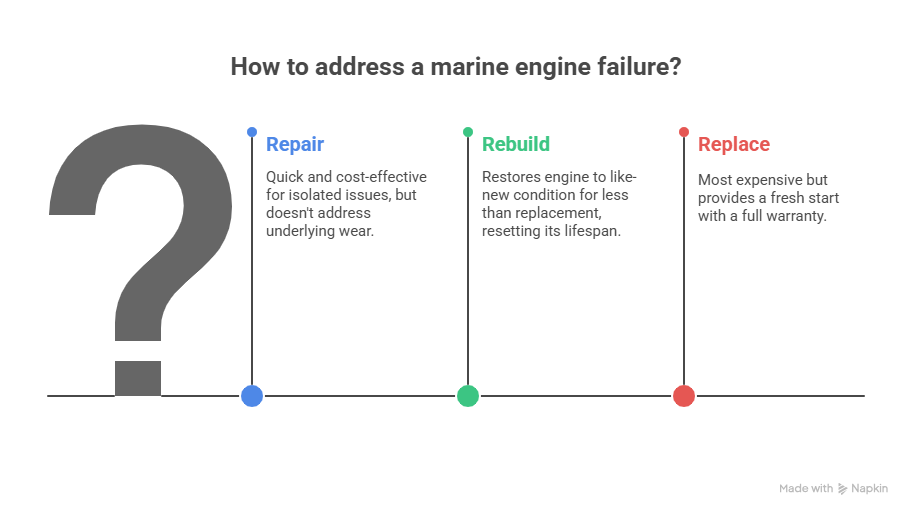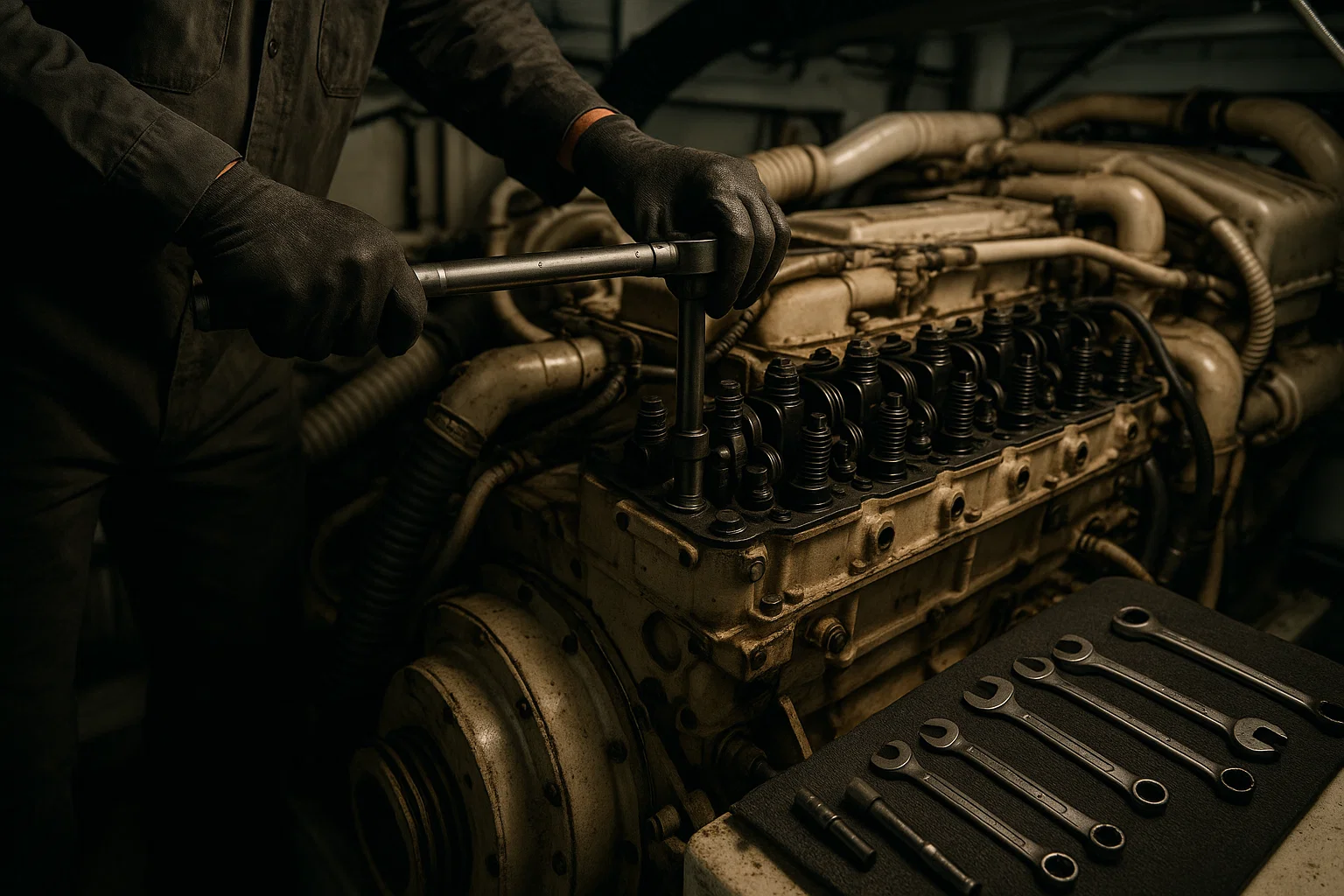That Sinking Feeling Miles Offshore
I’m Alex, and I’ve been wrenching on boats in South Florida for the better part of two decades. I’ve seen it all, but the call I dread most is the one that comes from a panicked voice, miles offshore, with a dead engine and a setting sun. That’s not just an inconvenience; that’s a real-deal safety situation.
Just last summer, a guy named Javier with a beautiful Sea Ray 320 called me from near Stiltsville. His port engine sputtered and died. He’d been ignoring a weird vibration for weeks, hoping it would just go away. It didn’t. Instead, it turned into a cracked engine block and a very expensive tow back to Dinner Key Marina. His story is a classic example of why professional marine engine repair isn’t a luxury—it’s the only thing standing between a great day on the water and a potential disaster.
You wouldn’t run a business on a computer that crashes every day, so why would you trust your life to an engine that’s on the fritz? In this guide, I’m going to cut through the jargon and give you the straight scoop on marine engine repair. We’ll talk about what to watch for, what a good shop actually does, and how to make smart decisions that will keep your engine from turning into a thousand-pound paperweight.
Table of Contents
Why You Can’t Skimp on Expert Marine Engine Repair
A boat engine isn’t just a car engine marinized. It lives in a saltwater hell, runs under constant load, and is way more complex than most people think. Settling for a cheap fix or a general mechanic who “also does boats” is one of the fastest ways to wind up stranded.
Beyond the Basics: What a Real Pro Knows
Your engine has a brain—an Electronic Control System (ECS)—that manages everything from fuel injection to timing. When that throws a code, you can’t just guess. You need the right diagnostic computer and, more importantly, someone who knows what the data actually means. I remember a client, Sofia, with a newer Volvo Penta that kept losing power. Three different shops replaced parts, but the problem kept coming back. We plugged in our gear and found a tiny, intermittent fault in a sensor that only showed up under specific RPMs. That’s the difference between just turning wrenches and real marine engine repair.
A certified tech who knows your brand—be it Cat, Cummins, Yamaha, or Mercury—understands its specific quirks. They follow the manufacturer’s specs, use the right parts, and won’t void your warranty.
Preventing Headaches Down the Line
Good marine engine repair is proactive, not just reactive. Every dollar you spend on proper maintenance today saves you ten in emergency repairs tomorrow. It’s about catching that weird noise before it becomes a catastrophic failure. High-quality parts and expert work don’t just fix today’s problem; they make your engine more reliable for years to come.
What a Good Shop Actually Does for You
When you bring your boat in for service, it should be more than just a quick oil change. A comprehensive marine engine repair service covers the whole nine yards, from figuring out what’s wrong to getting you back on the water safely.
Finding the Real Problem: Advanced Diagnostics
The days of just listening to an engine and guessing are over. Modern marine engine repair starts with plugging into the engine’s computer. We pull data, run tests, and look for the root cause of the problem, not just the symptom. This is how we find those sneaky issues that cause recurring breakdowns. It’s about fixing it right the first time.
To Fix, Rebuild, or Replace? The Big Question
When you have a major failure, you’ve got options. People always ask me what makes the most sense. Honestly, it depends. I put together this table based on dozens of jobs I’ve done right here in Miami to help break it down.
| Option | Best For | Typical Cost (Miami Area) | My Two Cents |
|---|---|---|---|
| Repair | A single, specific broken part (e.g., bad alternator, failed water pump). | $300 – $2,500 | Quick and cost-effective for isolated problems. But it won’t fix underlying engine wear. |
| Rebuild | An engine with good “bones” but significant internal wear (e.g., bad rings, worn bearings). | $5,000 – $15,000+ | A great way to get a like-new engine for less than a replacement. You’re basically resetting the clock on its life. |
| Replace | A catastrophically failed engine (cracked block) or a very old, unreliable motor. | $10,000 – $50,000+ | The most expensive option, but sometimes it’s the only smart move. Gives you a fresh start with a full warranty. |
We Come to You: Mobile and On-Site Service
Let’s face it, hauling your boat to a shop can be a massive pain. That’s why 24/7 mobile marine engine repair is a lifesaver. Whether you’re stuck at the dock with an engine that won’t start or need routine maintenance at your slip, a good mobile tech brings the expertise and tools directly to you. It’s the ultimate convenience.
It Matters What’s Under the Cowl: Engine Types
You wouldn’t take a Ferrari to a Ford mechanic. The same logic applies to boats. The expertise needed for a 400hp outboard is wildly different from what’s required for a 1,000hp inboard diesel.
- Outboards (Yamaha, Mercury, etc.): These are compact powerhouses. We see a lot of fuel system issues from ethanol, electrical gremlins from saltwater intrusion, and lower unit damage. They require precision work in tight spaces.
- Inboard Diesels (Cat, MAN, Cummins): These are the workhorses of bigger yachts and commercial boats. A proper diesel marine engine repair specialist needs to understand complex fuel injection systems, turbochargers, and cooling systems that are a world away from a gas engine.
- Sterndrives (Mercruiser, Volvo Penta): These are a hybrid of an inboard engine and an outboard drive. They have their own unique set of problems, especially with the bellows, gimbals, and drive gears. They require a tech who understands both sides of the system.
Always look for a shop with factory-trained techs for your specific brand. That certification means they’ve been taught by the people who built your engine.

Troubleshooting and Maintenance Tips from the Trenches
Your engine talks to you. You just have to learn its language. Unusual noises, new vibrations, a drop in RPMs, or smoke that looks different are all signs it’s trying to tell you something is wrong. Don’t ignore them.
- Check the simple stuff first: Is there water in the fuel? Is the battery connection clean and tight? Is the sea strainer clogged? You’d be amazed how many “major” problems are something simple.
- Know your wear parts: Impellers, anodes, filters, belts, and spark plugs are designed to be replaced regularly. Keeping these fresh is the cheapest insurance you can buy for your engine’s health.
- Safety first, always: When you’re working in the engine room, disconnect the batteries, make sure you have good ventilation, and be careful with fuel. If you’re not 100% confident, call a pro. A mistake can be dangerous or incredibly expensive. This is a core part of any professional marine engine repair process.
FAQ: Quick Questions I Get at the Dock
Why is marine engine repair so expensive?
Because the parts are specialized for a corrosive saltwater environment, production volumes are lower than for cars, and the work requires a highly skilled technician. You’re paying for expertise and durability, not just a part.
How often should I get my engine serviced?
Follow your manufacturer’s recommendation, which is usually every 100 hours or once a year, whichever comes first. If you’re in saltwater, I’d lean towards doing it more often.
Is a “remanufactured” part as good as a new one?
Sometimes, yes. A high-quality remanufactured starter or alternator from a reputable company can be a great value. But for critical internal parts, I almost always recommend genuine OEM. The peace of mind is worth it.
Can I use car oil in my boat engine?
No. Absolutely not. Marine engines run under different loads and temperatures. Marine-grade oil has specific additives to protect against moisture and corrosion. Using car oil is a fast track to a major marine engine repair bill.
My engine overheated. Can I just let it cool down and keep going?
You can, but you shouldn’t. Overheating is a symptom of a problem—usually a failed impeller, a clog, or a bad thermostat. If you just keep running it, you risk warping the heads or seizing the engine. Find the cause.
The Bottom Line: Your Engine Is Your Lifeline
Look, at the end of the day, professional marine engine repair isn’t an expense; it’s an investment in your safety and the life of your boat. It’s about having the confidence to head offshore knowing your engine will get you home.
- Be Proactive: Don’t wait for things to break. Regular maintenance is your best friend.
- Find a Certified Pro: Look for technicians trained on your specific engine brand.
- Listen to Your Engine: Those weird noises and vibrations are warnings. Act on them.
- Don’t Just Go for the Cheapest Quote: You often get what you pay for. A good shop with a strong reputation is worth a few extra bucks.
Your boat is your ticket to freedom and adventure. By taking care of its heart, you’re making sure those adventures are safe, reliable, and memorable for all the right reasons.
Author Bio
I’m Alex, a 15-year marine technician in South Florida, ABYC-certified. I’ve performed hundreds of major overhauls on everything from Yamaha outboards to MAN diesels. At marinas like Dinner Key and Bahia Mar, I’ve earned a reputation for diagnosing the tough problems and keeping boats running reliably in our demanding saltwater environment.


Leave a Reply